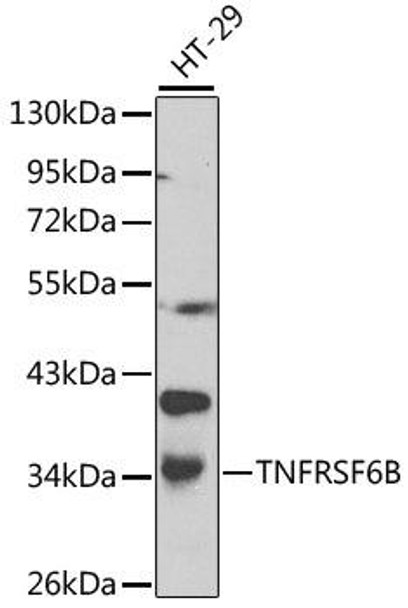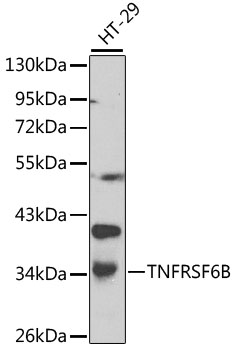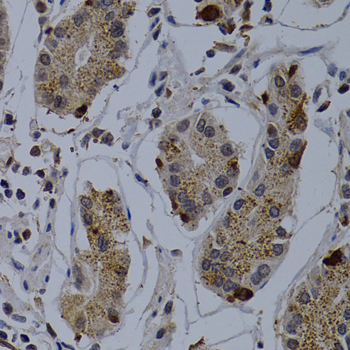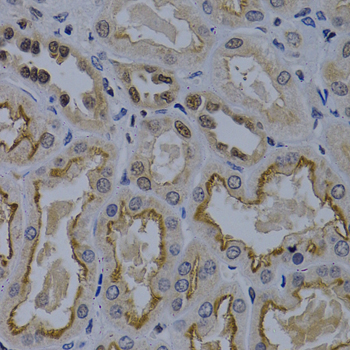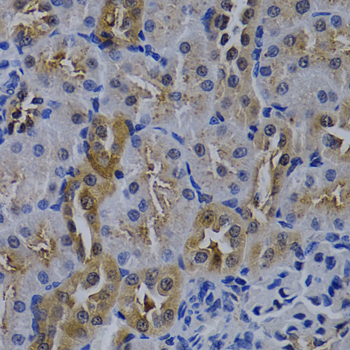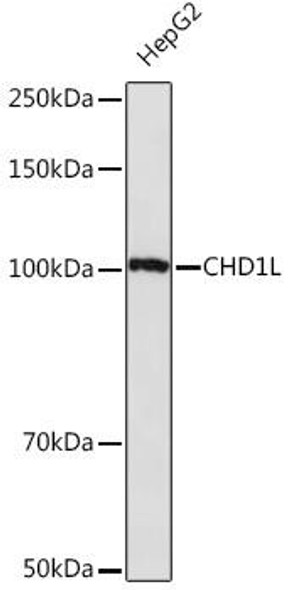Anti-TNFRSF6B Antibody (CAB0649)
- SKU:
- CAB0649
- Product type:
- Antibody
- Reactivity:
- Human
- Rat
- Host Species:
- Rabbit
- Isotype:
- IgG
- Antibody Type:
- Polyclonal Antibody
- Research Area:
- Cell Death
Frequently bought together:
Description
| Antibody Name: | Anti-TNFRSF6B Antibody |
| Antibody SKU: | CAB0649 |
| Antibody Size: | 20uL, 50uL, 100uL |
| Application: | WB IHC |
| Reactivity: | Human, Rat |
| Host Species: | Rabbit |
| Immunogen: | Recombinant fusion protein containing a sequence corresponding to amino acids 35-300 of human TNFRSF6B (NP_003814.1). |
| Application: | WB IHC |
| Recommended Dilution: | WB 1:500 - 1:2000 IHC 1:50 - 1:200 |
| Reactivity: | Human, Rat |
| Positive Samples: | HT-29 |
| Immunogen: | Recombinant fusion protein containing a sequence corresponding to amino acids 35-300 of human TNFRSF6B (NP_003814.1). |
| Purification Method: | Affinity purification |
| Storage Buffer: | Store at -20°C. Avoid freeze / thaw cycles. Buffer: PBS with 0.02% sodium azide, 50% glycerol, pH7.3. |
| Isotype: | IgG |
| Sequence: | TYPW RDAE TGER LVCA QCPP GTFV QRPC RRDS PTTC GPCP PRHY TQFW NYLE RCRY CNVL CGER EEEA RACH ATHN RACR CRTG FFAH AGFC LEHA SCPP GAGV IAPG TPSQ NTQC QPCP PGTF SASS SSSE QCQP HRNC TALG LALN VPGS SSHD TLCT SCTG FPLS TRVP GAEE CERA VIDF VAFQ DISI KRLQ RLLQ ALEA PEGW GPTP RAGR AALQ LKLR RRLT ELLG AQDG ALLV RLLQ ALRV ARMP GLER SVRE RFLP VH |
| Gene ID: | 8771 |
| Uniprot: | O95407 |
| Cellular Location: | Secreted |
| Calculated MW: | 32kDa |
| Observed MW: | 33kDa |
| Synonyms: | TNFRSF6B, DCR3, DJ583P15.1.1, M68, M68E, TR6 |
| Background: | This gene belongs to the tumor necrosis factor receptor superfamily. The encoded protein is postulated to play a regulatory role in suppressing FasL- and LIGHT-mediated cell death. It acts as a decoy receptor that competes with death receptors for ligand binding. Over-expression of this gene has been noted in gastrointestinal tract tumors. Read-through transcription into this gene from the neighboring upstream gene, which encodes regulator of telomere elongation helicase 1 (RTEL1), generates a non-coding transcript. |
| UniProt Protein Function: | TNFRSF6B: Decoy receptor that can neutralize the cytotoxic ligands TNFS14/LIGHT, TNFSF15 and TNFSF6/FASL. Protects against apoptosis. Detected in fetal lung, brain and liver. Detected in adult stomach, spinal cord, lymph node, trachea, spleen, colon and lung. Highly expressed in several primary tumors from colon, stomach, rectum, esophagus and in SW480 colon carcinoma cells. |
| UniProt Protein Details: | Protein type:Secreted, signal peptide; Secreted Chromosomal Location of Human Ortholog: 20q13.3 Cellular Component: extracellular space Molecular Function:protein binding; receptor activity Biological Process: apoptosis; negative regulation of apoptosis |
| NCBI Summary: | This gene belongs to the tumor necrosis factor receptor superfamily. The encoded protein is postulated to play a regulatory role in suppressing FasL- and LIGHT-mediated cell death. It acts as a decoy receptor that competes with death receptors for ligand binding. Over-expression of this gene has been noted in gastrointestinal tract tumors. Read-through transcription into this gene from the neighboring upstream gene, which encodes regulator of telomere elongation helicase 1 (RTEL1), generates a non-coding transcript. [provided by RefSeq, Feb 2011] |
| UniProt Code: | O95407 |
| NCBI GenInfo Identifier: | 14790170 |
| NCBI Gene ID: | 8771 |
| NCBI Accession: | NP_116563.1 |
| UniProt Related Accession: | O95407 |
| Molecular Weight: | 32,680 Da |
| NCBI Full Name: | |
| NCBI Synonym Full Names: | TNF receptor superfamily member 6b |
| NCBI Official Symbol: | TNFRSF6B |
| NCBI Official Synonym Symbols: | M68; TR6; DCR3; M68E; DJ583P15.1.1 |
| NCBI Protein Information: | tumor necrosis factor receptor superfamily member 6B |
| UniProt Protein Name: | Tumor necrosis factor receptor superfamily member 6B |
| UniProt Synonym Protein Names: | Decoy receptor 3; DcR3; Decoy receptor for Fas ligand; M68 |
| Protein Family: | Tumor necrosis factor receptor superfamily |
| UniProt Gene Name: | TNFRSF6B |
| UniProt Entry Name: | TNF6B_HUMAN |

